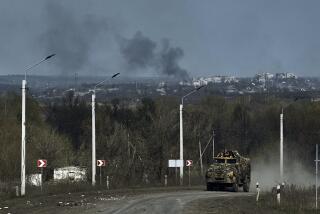Pentagon Backs Up on Rules of Media Coverage After an Outcry
- Share via
WASHINGTON — The Defense Department agreed Friday to revise and perhaps ease plans for controlling news coverage of any Persian Gulf war, amid media complaints that the Pentagon was proposing tight censorship and even engaging in “psychological warfare” to intimidate journalists.
“We have a long way to go to sharpen up the ground rules and make them simple to understand,” Pentagon spokesman Pete Williams said during an acrimonious two-hour session with the Washington bureau chiefs of the nation’s major news organizations.
On Thursday, U.S. commanders in Saudi Arabia sent reporters a detailed set of proposed rules that are far more restrictive than those the news media faced in Vietnam.
The proposals, only the latest in a series offered by the Pentagon, stipulated that all material gathered by the combat press pool undergo a “security review,” that reporters remain with their military escort at all times and that they be forbidden even to talk to off-duty soldiers in public places.
It also listed the kinds of information that would be “releasable” as well as those that would not be. Among the information not for release would be numbers of troops, aircraft, tanks or trucks; names of military installations; information on intelligence activities, and coverage of religious services in Saudi Arabia.
“These are far too restrictive, and frankly we think we could not agree to it,” George Watson, Washington bureau chief for ABC News, told Williams.
“In an actual war, when adrenalin is pumping and emotions are high, these things are going to be interpreted in a way that everything will be shut down except the most inane kind of information,” said Michael Getler, assistant managing editor for foreign news at the Washington Post.
Several agreed with one complaint that creating several different sets of guidelines was designed to confuse and intimidate the press, as in psychological warfare.
Williams said the proposals were never meant as final and said he will deliver a simpler set of rules next week after discussions with top commanders.
The only thing the Pentagon wants to forbid, Williams contended, is information that discloses future military operations, jeopardizes current operations or provides information useful to the enemy.
More to Read
Sign up for Essential California
The most important California stories and recommendations in your inbox every morning.
You may occasionally receive promotional content from the Los Angeles Times.











